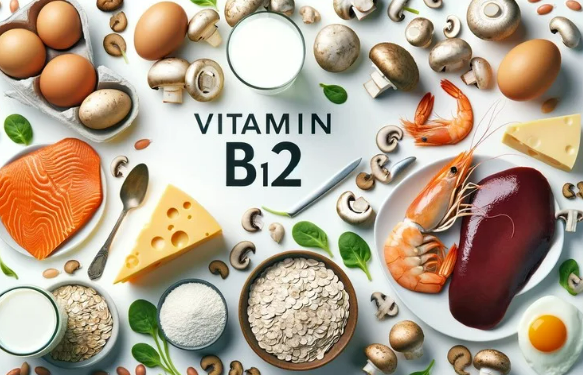Understanding Vitamin B12 Deficiency: Causes, Symptoms, and Treatment
Vitamin B12, also known as cobalamin, is a water-soluble vitamin essential for various bodily functions, including the formation of red blood cells, DNA synthesis, and neurological function. Despite its importance, many people suffer from vitamin B12 deficiency, which can lead to serious health issues if left untreated. This article will explore the causes, symptoms, risk factors, and treatment options for vitamin B12 deficiency.
What is vitamin B12 deficiency ?
Vitamin B12 deficiency occurs when the body does not have enough B12 to perform its essential functions. Since the human body does not produce Vitamin B12, it must be obtained from dietary sources or supplements. The liver stores Vitamin B12, and these reserves can last for several years. However, deficiency can occur due to various factors, including poor dietary intake and absorption issues.
Causes of Vitamin B12 Deficiency
- Dietary Deficiency:
- Individuals who consume a vegetarian or vegan diet may not get enough Vitamin B12 since it is primarily found in animal products such as meat, fish, poultry, eggs, and dairy.
- Malabsorption Issues:
- Conditions like pernicious anemia (an autoimmune disorder) prevent the body from absorbing Vitamin B12 properly.
- Gastrointestinal disorders such as Crohn’s disease, celiac disease, and chronic gastritis can interfere with nutrient absorption.
- Surgical procedures affecting the stomach or small intestine, such as gastric bypass surgery, can also hinder B12 absorption.
- Medications:
- Long-term use of certain medications, such as proton pump inhibitors (PPIs), H2 blockers, and metformin, can reduce Vitamin B12 absorption.
- Age:
- Older adults are more likely to have difficulty absorbing Vitamin B12 due to decreased stomach acid production.
- Alcohol Abuse:
- Excessive alcohol consumption can affect the body’s ability to absorb nutrients.
Symptoms of Vitamin B12 Deficiency
Vitamin B12 deficiency can manifest with a wide range of symptoms, which can vary in severity. Common symptoms include:
- Fatigue and Weakness: A lack of B12 impairs red blood cell production, leading to anemia and decreased oxygen delivery to tissues.
- Neurological Symptoms: Tingling or numbness in the hands and feet, difficulty walking, and balance issues.
- Cognitive Issues: Memory loss, confusion, and trouble concentrating.
- Pale or Jaundiced Skin: Reduced red blood cell production can lead to pale skin, and damaged red blood cells can cause jaundice.
- Mouth Ulcers and Glossitis: inflammation and pain in the tongue, along with sores in the mouth.
- Mood Changes: Depression, irritability, and mood swings.
If left untreated, severe vitamin B12 deficiency can lead to irreversible nerve damage and cognitive impairment.
Risk Factors
Certain groups are more susceptible to vitamin B12 deficiency, including:
- Vegetarians and Vegans: Due to limited B12 intake from plant-based foods.
- Pregnant and Breastfeeding Women: Especially those on a vegetarian or vegan diet, as the demand for B12 increases during pregnancy.
- Older Adults: Due to reduced stomach acid, which is necessary for B12 absorption.
- Individuals with Gastrointestinal Disorders: Conditions that affect nutrient absorption increase the risk of deficiency.
- People Who Have Undergone Stomach or Intestinal Surgery: These procedures may affect B12 absorption.
Diagnosis of Vitamin B12 Deficiency
A healthcare provider may diagnose Vitamin B12 deficiency through:
- Blood Tests: Measuring Vitamin B12 levels in the blood.
- Complete Blood Count (CBC): To check for anemia.
- Methylmalonic Acid (MMA) and Homocysteine Tests: Elevated levels of these substances can indicate B12 deficiency.
- Schilling Test: A historical test to determine absorption issues, though not commonly used today.
Treatment Options
Treatment depends on the severity and cause of the deficiency. Common options include:
- Dietary Changes:
- Increasing intake of Vitamin B12-rich foods such as beef, chicken, fish, dairy products, and eggs. Fortified plant-based foods like cereals and plant milks are also beneficial for vegetarians and vegans.
- Vitamin B12 Supplements:
- Oral supplements or sublingual (under the tongue) tablets can be effective for mild deficiencies.
- B12 Injections:
- For those with severe deficiencies or absorption issues, B12 injections may be necessary to quickly restore levels.
- Intranasal Gel:
- This method can be used for maintenance therapy after initial treatment.
Prevention of Vitamin B12 Deficiency
Preventing Vitamin B12 deficiency involves:
- Eating a Balanced Diet: Including sufficient B12-rich foods.
- Supplementation: For those at risk (vegetarians, vegans, older adults, and pregnant women).
- Regular Monitoring: If you have a medical condition that affects B12 absorption, periodic blood tests can help catch deficiencies early.
Conclusion
Vitamin B12 is essential for maintaining overall health, and deficiency can lead to serious consequences if untreated. Individuals can prevent long-term complications by understanding the causes, recognizing symptoms, and seeking timely treatment. For those at risk, maintaining a balanced diet, taking supplements, and monitoring B12 levels are key steps to staying healthy.


